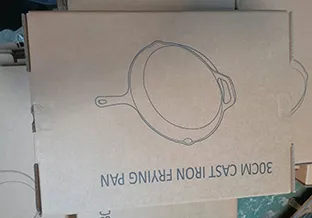
is cast iron the healthiest cookware
Is Cast Iron the Healthiest Cookware?
When it comes to selecting cookware, health-conscious individuals often consider various materials and their potential effects on food and health. One popular option is cast iron cookware, lauded for its durability and rustic charm. But is cast iron truly the healthiest choice for cooking? Let's explore the benefits and potential drawbacks of using cast iron in the kitchen.
Benefits of Cast Iron Cookware
1. Natural Non-Stick Surface When properly seasoned, cast iron cookware can develop a natural non-stick surface. This means that you can often cook with less oil or fat, which is a plus for those aiming to reduce calorie intake.
2. Iron Fortification One of the most notable advantages of cast iron cookware is that it can leach small amounts of iron into food. This can be beneficial for individuals with iron deficiency or anemia. Cooking acidic foods, like tomatoes, may increase the amount of iron that gets transferred, making it a helpful factor in dietary iron supplementation.
3. Even Heat Distribution Cast iron is renowned for its excellent heat retention and distribution. This characteristic allows food to cook evenly, reducing the likelihood of hot spots that can scorch food. Even cooking can enhance the quality of meals, making them more enjoyable and potentially healthier.
4. Versatility Cast iron cookware is incredibly versatile. It can be used on the stovetop, in the oven, or even over an open flame. This adaptability allows for various cooking methods, from baking to frying, which can lead to more diverse and nutritious meals.
is cast iron the healthiest cookware

Potential Drawbacks
Despite its many benefits, there are also some considerations to keep in mind when using cast iron cookware.
1. Reactivity with Certain Foods While cooking acidic foods can enhance iron leaching, it can also cause the cookware to react negatively with certain ingredients, potentially leading to off-flavors. Care should be taken when cooking items like citrus-based sauces.
2. Maintenance Cast iron requires a bit more care than other types of cookware. It needs to be seasoned regularly to maintain its non-stick properties and to prevent rust. This maintenance might not appeal to everyone, especially those looking for low-effort cooking solutions.
3. Weight Cast iron is heavy, which can be cumbersome for some cooks. This weight can make it difficult to handle, especially for individuals with limited strength or mobility.
Conclusion
In summary, cast iron cookware has a lot to offer in terms of health benefits, particularly its ability to fortify meals with iron and its natural non-stick capabilities. However, it comes with certain challenges that require consideration. For many, the benefits outweigh the drawbacks, making cast iron a worthy addition to a healthy kitchen. Ultimately, whether cast iron is the healthiest cookware choice depends on individual needs, cooking styles, and personal preferences. As with any cookware, it is essential to balance the benefits with any potential limitations to make the best choice for your culinary practices.
-
Season Cast Iron Perfectly with GPT-4 Turbo TipsNewsAug.01,2025
-
High Quality Cast Iron Cookware - Baixiang County Zhongda MachineryNewsAug.01,2025
-
Premium Cast Iron Pan: Durable & Perfect HeatNewsAug.01,2025
-
High Quality Kitchen Durable Black Round Cast Iron Cookware Pancake Crepe Pan-Baixiang County Zhongda Machinery Manufacturing Co., Ltd.NewsAug.01,2025
-
Cast Iron Cookware - Baixiang County Zhongda Machinery | Nonstick, Heat ResistanceNewsAug.01,2025
-
High Quality Kitchen Durable Black Round Cast Iron Cookware - Baixiang County Zhongda Machinery | Non-Stick, Heat Retention, DurableNewsJul.31,2025


